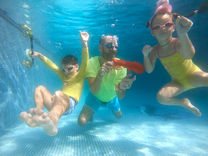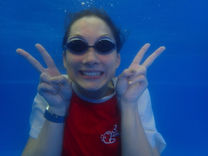Blog guest: Radovan Silijevski
He only started swimming when he was 14. Even though at the time it looked as if he wouldn’t have a successful swimming career, Radovan Silijevski managed to prove it wrong. In 2007 he qualified for the 2008 Olympic Games in Beijing, then he was a finalist at the European championship, Mediterranean Games, and University Olympic Games. He also qualified for the 2012 Olympic Games in London where he competed in both individual races and 4x100 relay. Today he is the coach of the first team, and as a Swimming Dad #Blog guest he talks about his first competition and whether it was a sweet or sour experience, and how he managed to deal with both victories and defeats.
Do you remember your first competition? Was it a sweet or sour experience, and what was more important then, the medal or support?
Honestly, I’m not sure whether it was my first competition, but it was definitely one of the first, Belgrade League, organised in Pancevo, around 2001. I swam 50m freestyle and the moment I jumped into the pool I lost my goggles. Luckily that’s the shortest discipline so the agony didn’t last too long. I remember being very angry even though I wasn’t told off either by my coach or my parents after the race. Given the fact that I wasn’t among the top three, I realised it would take me a lot of time and effort before I won a medal, and I really appreciated my coach’s and parents’ support. I remember my first medal, it was back in 2003 at the Emperor Constantine competition in Nis. I won the 50m freestyle bronze medal in junior competition and I was very happy.
What was the advice you got before the race?
I can’t remember the advice before the race, but I remember those after the race and how to fix my goggles . I believe that in general the best advice you can get is from other swimmers, especially those top-class ones. I remember how much I appreciated the advice from Mladen Tepavcevic and Milorad Cavic, because they were my role model swimmers at the time. Of course, every advice I got from my coaches was priceless and without them I wouldn’t be achieve anything in my career.
Are you one of those saying: it's not the winning but the taking part that counts? Did you train because of the medals, your health, gaining new experience, knowledge, skills, friends, or something else?
Since I started swimming later than most swimmers, I was only able to take part at the beginning. When I won my first medal it was an extra motive to work harder as I thought I could be even better if I put more effort during my trainings. When I became a senior, I started paying attention to details and skills that world class swimmers had. Friends were important too, but my main motive was to be the best in the given circumstances. I had a lot of opportunities to travel in my career and meet many people. I am still in touch with some of them but that wasn’t my priority, it happened spontaneously. If you are really committed to something, people with a similar sensibility can recognise that and you can easily forge strong friendships… at least that’s what I think.
Besides medals, how did you learn to accept defeats?
No matter whether it is a lost medal or unachieved goal, any failure leaves a bitter aftertaste. These moments are very delicate and can cause very negative reactions, especially with young swimmers. When I experienced those situations, I was very lucky to have great people around me full of support and understanding, and that really helped me shorten the “grieving” period.
In your experience, how much today’s kids have healthy attitude towards competitions, do they get to enjoy swimming?
I think it depends a lot on the coaches and parents. There has always been a pressure to succeed when you are very young. I was lucky enough to have my parents involved in my swimming in the right amount. Swimming was my thing
and I wouldn’t have wanted them being involved more than I was. Coaches can also be too ambitious and expect “great” results from their younger swimmers, which can lead to children giving up on swimming. Today I am a swimming coach and I can say there are many kids who enjoy swimming, who are looking forward not only to the medals but achieving those “little” goals, gaining new skills, and being happy for their friends’ successes. I also believe that Internet has helped a lot with parents understand how not to behave in certain situations that could negatively affect their children.














































Comments